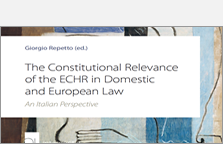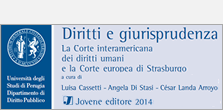Negli ultimi anni, le pronunce della Corte europea per i diritti umani (CEDU) hanno assunto un contenuto sanzionatorio più ampio di quello che era stato originariamente conferito loro dall’art. 41 della CEDU. Attenendosi alla lettera della disposizione da ultimo citata, la Corte di Strasburgo non sarebbe legittimata ad ordinare allo Stato autore della violazione il ripristino dello stato di fatto anteriore al compimento dell’illecito né, qualora la restitutio in integrum si rivelasse inattuabile, essa potrebbe accordare alla parte lesa un risarcimento per il danno subìto.La Corte, dunque, può unicamente prevedere a favore della vittima un’«equa soddisfazione», ma solo nel caso in cui l’ordinamento dello Stato autore della violazione non abbia permesso di riparare adeguatamente.
Avendo natura dichiarativa, le sentenze della Corte dovrebbero perciò limitarsi ad accertare se, nel caso sottoposto a giudizio, vi sia stata la violazione di una disposizione convenzionale, non potendo invece rimediare esse stesse alle violazioni constatate attraverso l’annullamento o la modifica delle norme interne oggetto di contestazione, o attraverso l’imposizione alla Stato responsabile di altre misure riparatorie specifiche.
I recenti orientamenti della Corte di Strasburgo sembrano contraddire la tesi da ultimo citata. A differenza del passato, infatti, le sentenze della Corte non si limitano semplicemente ad accertare la compatibilità con la Convenzione europea degli effetti che determinate misure statali producono in capo al ricorrente, ma sono altresì solite andare oltre l’oggetto formale della causa, valutando in astratto le conseguenze che quelle stesse misure sono suscettibili di produrre nei confronti di chiunque venga a trovarsi in una posizione analoga a quella del ricorrente.
In conseguenza di ciò, oltre alla ordinaria efficacia di cosa giudicata in senso sostanziale, discendente dall’art. 46 §1 della Convenzione europea, le sentenze della Corte sembrano dotate di un quid pluris, consistente nel porre a carico dello Stato responsabile di una violazione della Convenzione un obbligo aggiuntivo di adottare provvedimenti a carattere generale destinati a scongiurare il ripetersi di violazioni analoghe a quelle già accertate dalla Corte.
Questo nuovo orientamento giurisprudenziale fornisce lo spunto per riflettere sia sull’estensione della competenza della Corte europea a pronunciarsi sulle conseguenze derivanti dalla violazione della CEDU, sia sugli effetti che le sentenze della medesima possono produrre nell’ordinamento giuridico interno dello Stato responsabile. In particolare, l’obiettivo della ricerca è di verificare, alla luce della giurisprudenza degli organi di Strasburgo e della prassi statale, se l’obbligo di conformarsi alle sentenze della Corte implichi anche l’adozione di misure a portata individuale, come la revisione di processi interni conclusisi con una sentenza passata in giudicato, e di misure a carattere generale, quali abrogazioni legislative, modifiche di norme statali e di prassi amministrative o giudiziarie.
In recent years, the decisions of the European Court of Human Rights have covered a broader range of arguments than those originally envisaged by Article 41 ECHR.
According to the letter of this Article, the Strasbourg Court would not be entitled to order the responsible State to restore the state of affairs that existed before the wrongful act was committed; nor would the Court be entitled to grant the injured party compensation for the damage suffered if restitutio in integrum is not possible. The Court, therefore, can only award “just satisfaction” to the injured party, but only if domestic law does not allow complete reparation to be made.
Given their declarative nature, the judgments of the Court should only establish whether there has been a breach of a treaty provision in the specific case before the Court. On the contrary, said judgments should not be allowed to restore the infringements of the Convention by annulling or amending the censored internal provisions, or by ordering the responsible State to adopt measures of restitution in kind.
The recent orientations of the Strasbourg Court seem to contradict this idea. Indeed, in contrast with the past, the judgments of the Court do not merely assess the compatibility with the ECHR of the effects produced by certain domestic measures to the detriment of the applicant. They go beyond the simple identification of wrong individual decisions, by also evaluating in abstracto the consequences that systemic problems are likely to have on any other person in a similar situation to that of the applicant. As a consequence, in addition to the ordinary res judicata effect stemming from Article 46, par. 1 of the ECHR, the Court's judgments are characterized by a quid pluris.
In other words, they seem to imply an additional obligation on the state that is responsible for a violation of the Convention, by binding the same state to adopt measures of a general nature, in order to prevent the reiteration of violations similar to those found by the Court. This innovative case-law provides an opportunity to reexamine both the extent of the Court’s competence to make pronouncements on the consequences resulting from a breach of the ECHR, and the effects that the same judgments can produce in the domestic legal system of the responsible states. In particular, the purpose of this section is to verify, in the light of Strasbourg case-law and state practice, whether the obligation to comply with the decisions of the Court also requires the adoption of individual measures, such as the revision of a final judgment, and of measures of a general nature, such as the abrogation or modification of a statute, or changes in administrative or judicial practices.
Elenco sottosezioni / Subsections list
Enforcement delle decisioni della Corte di Strasburgo
The Enforcement of ECtHR Decisions













